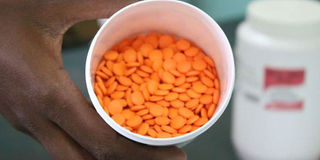Public must get involved in drug safety

All drugs legally sold in Kenya have a local registration number issued by the PPB. FILE PHOTO | NATION MEDIA GROUP
What you need to know:
- Any healthcare system seeks to maximise clinical outcomes with minimal resources and the least inconvenience to the patient.
- The public must be curious about the source and details, such as expiry dates and the general physical appearance, of medicines.
Recent reports about the presence of counterfeit condoms have once again ignited the debate about the quality and safety of medicines and other healthcare products.
That and the query about the efficacy of the popular anti-malarial Duo-cotecxin have cast the spotlight on the effectiveness of local regulators in controlling the sale of counterfeit and substandard drugs.
The consequences of such glaring lapses are too grave an issue to be ignored.
Pharmacovigilance — the science and activities relating to the detection, assessment, understanding and prevention of adverse effects or any other drug-related problem — is a relatively new field in Kenya.
The regulatory body Pharmacy and Poisons Board (PPB) only set up a pharmacovigilance department in 2004 with operations and rollout much later, at the end of the decade.
DRUG EFFECTS
The World Health Organization (WHO) started pharmacovigilance activities in 1961 in response to a global tragedy involving thalidomide.
The drug, then prescribed for morning sickness in expectant mothers, was found to have caused thousands of children to suffer phocomelia, a condition in which babies are born without arms and legs.
Any healthcare system seeks to maximise clinical outcomes with minimal resources and the least inconvenience to the patient.
But this is not possible without a functional and efficient health commodities management system.
A properly functioning pharmacovigilance system ensures that drugs and other consumables are up to the required standard, safe and effective and indications specified and administered in the prescribed manner and form.
Failure to achieve any of these will manifest in deleterious effects, or adverse drug reactions (ADRs).
PREVENTION
The WHO defines ADRs as any response to a drug that is noxious and unintended and which occurs at doses normally used in man for the prophylaxis, diagnosis or therapy of disease or for the modifications of physiological function.
They are responsible for a significant proportion of mortality and morbidity and a large chunk of the healthcare costs is expended to manage the arising complications.
A recent study in South African hospitals published in 2016 found out that 8.4 per cent of all admissions were related to ADRs.
Not surprisingly, the study established that, given proper systems, 45 per cent of the cases were preventable.
QUALITY ASSURANCE
Besides the government and pharmaceutical manufacturers, the common mwananchi is a stakeholder — perhaps even the most critical — in drug safety because they are likely to bear the brunt of any lapse in the quality assurance systems.
The public must be curious about the source and details, such as expiry dates and the general physical appearance, of medicines.
Besides all drugs legally sold in Kenya having a local registration number issued by the PPB in the packaging, manufacturers have come up with ways to easily identify counterfeit — such as scratching in a particular place to reveal a unique hologram.
COUNTERFEIT
They should also report any side effects and suspected poor quality medicines, especially to the PPB online portal.
The problem of counterfeiting and sale of poor quality drugs is not a unique to Kenya.
However, recent developments — such as the operationalisation of the anti-counterfeiting law, improvement of pharmacovigilace capacity at the PPB and an increasing focus on health and healthcare products by the media – put the country on the right path to attaining drug safety.
Dr Kibathi, a pharmacist at Longisa County Hospital, Bomet County, is a master’s degree student at the University of Nairobi. [email protected]





